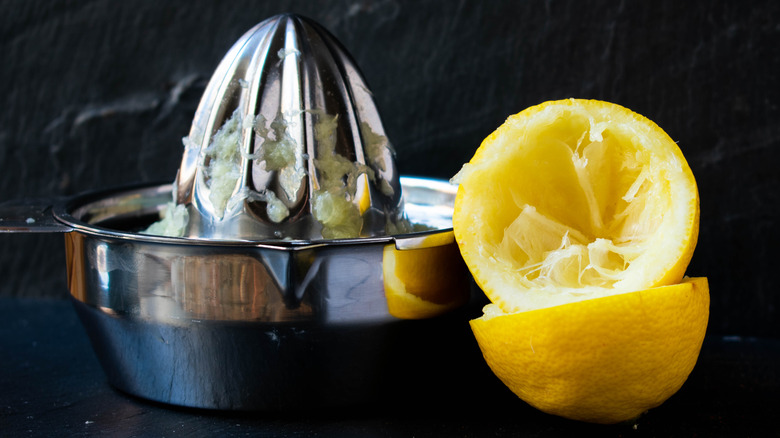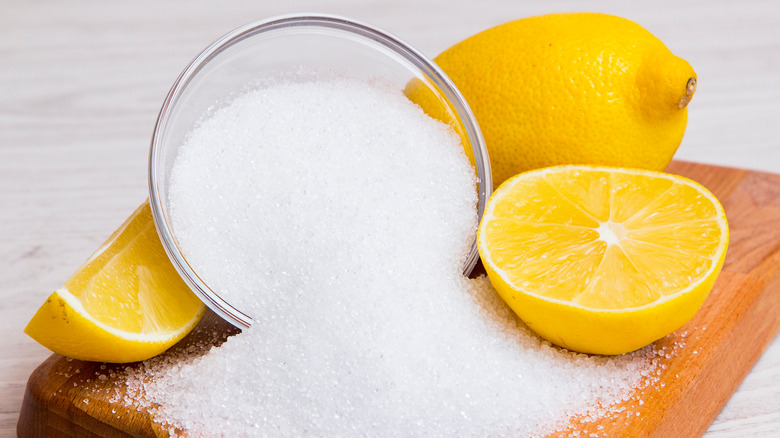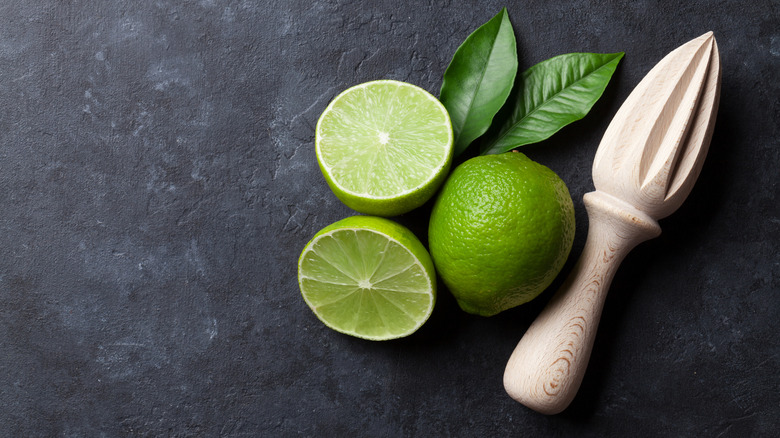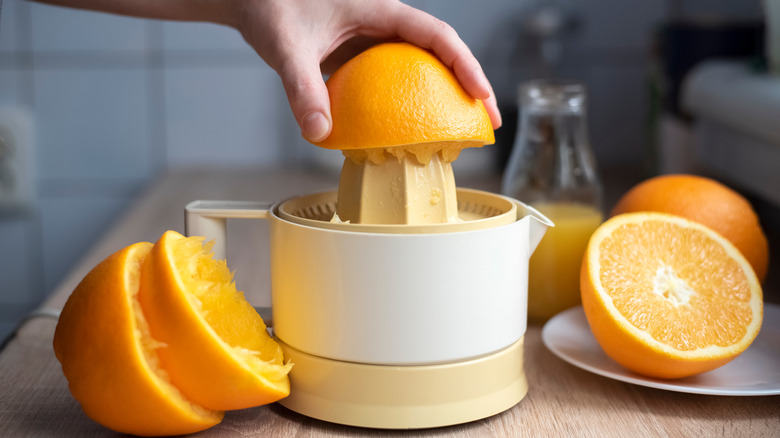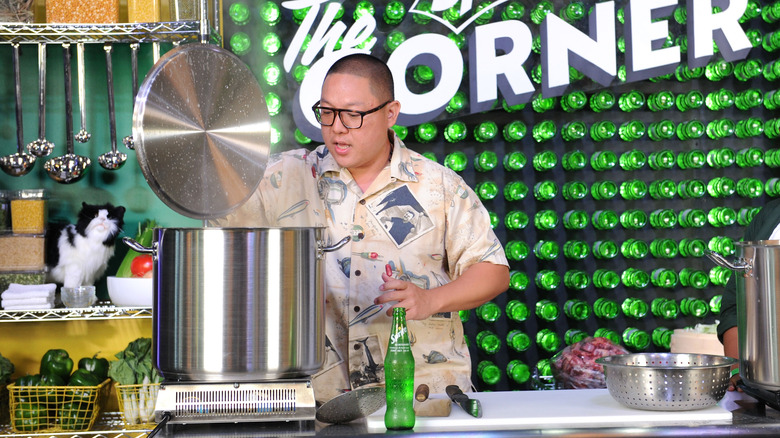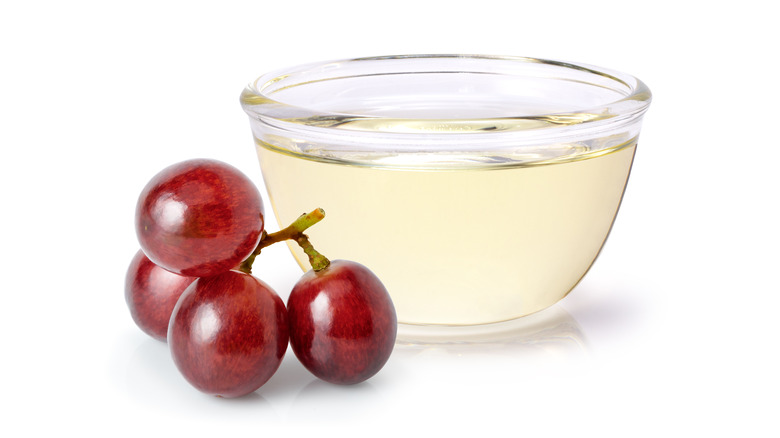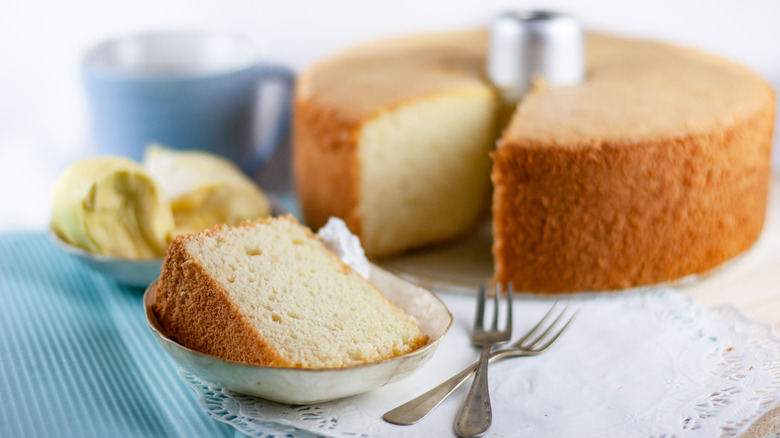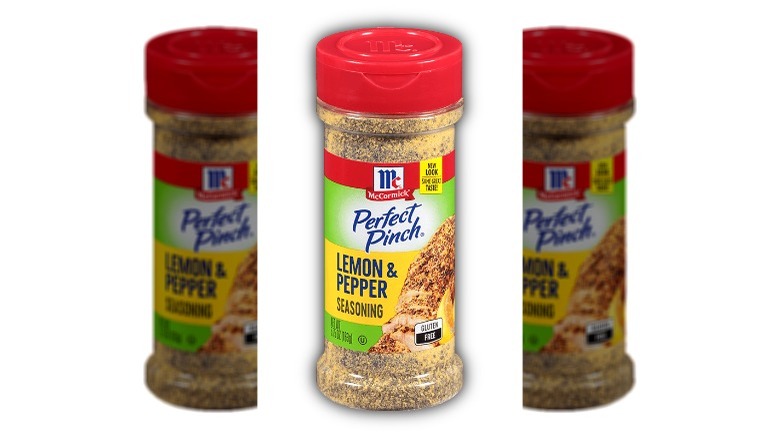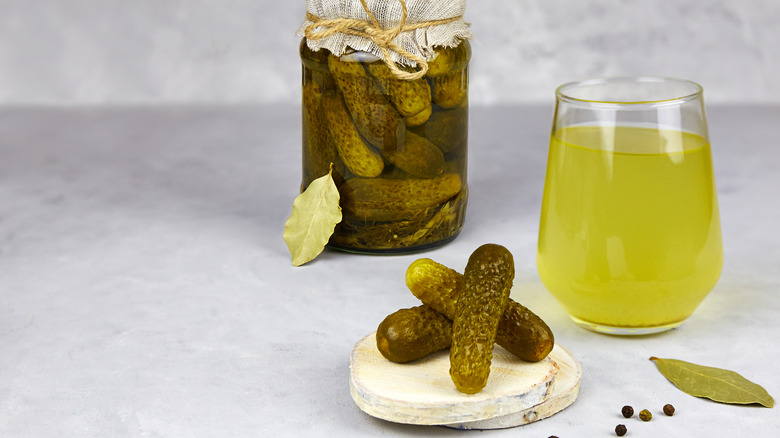9 Best Substitutes For Lemon Juice
If you had a massive stockpile of lemons but needed a pint of lemon juice to help get rid of garlic breath, just know that we've all been there. Fortunately, there are a number of great substitutes for lemon juice, some of which are shelf-stable and may already be sitting in your pantry.
The following advice may come as a bit of cold comfort if you're in the middle of cooking, but stocking your pantry with potential lemon juice substitutes is a great way to avoid being caught unprepared in the future. Citric acid, lemon pepper, and other pantry items will keep for many months and can be used in different ways that go far beyond being a lemon juice substitute.
A word of warning: Lemon juice substitutes are best when lemon isn't the main flavor in a drink or dish. Simply put, if you're substituting lime juice for lemon juice in a lemon meringue pie, it's no longer a lemon meringue pie. It's a lime meringue pie. With that, here are some of the best subsitutes for lemon juice.
Citric acid offers better living through chemistry
Available in powder form, citric acid is produced on an industrial scale as a food preservative, but modernist chefs have increasingly been embracing it as a citrus substitute. Citric acid was developed as a food additive in the 18th century by a Swedish researcher, per Healthline. It was made from lemon juice until the early 20th century when it was found the aspergillus niger mold creates citric acid as a byproduct of sugar metabolism. Today, citric acid powder is made via fermentation for use as a flavoring and preserving additive in a wide range of food products.
Citric acid is probably one of the best substitutes for lemon juice as evidenced by its increased use in craft cocktails. According to Imbibe, bartenders have been using citric acid to extend the utility of fresh-squeezed citrus juice and as a like-for-like replacement in syrups.
This use of citric acid was also behind the recent viral sensation known as Super Juice. Developed in an effort to make fresh-squeezed citrus juice more consistent and sustainable, Super Juice is made by exposing citrus peels to powdered citric acid. The powder draws out flavors from the peels and diluting the resulting liquid results in a shelf-stable juice that maintains its flavor for up to two weeks (via Smartblend).
Lime juice provides a comparable flavor profile
While the zests from lemons and limes taste very different from one another, the juices of these citrus fruits are almost interchangeable, according to Nigella Lawson. Lime juice has more natural sugars than lemon juice, and as a result, the former tastes slightly sweeter than the latter. However, the difference is small. When substituting lime juice for lemon juice, try to do so a little at a time and taste as you go. It's important to note that the average lemon will yield about twice as much juice as the average lime. It's important to take this into account when using a recipe that calls for "the juice of" one or more lemons.
The limes available in the average grocery store are technically Persian limes, which are preferred by growers due to their hardiness. Some specialty grocery stores will occasionally carry key limes, and key limes are different from regular limes. Commonly used to make key lime pie, key limes yield a juice that is more astringent and floral than Persian limes. Key lime juice could serve as a valid substitute for lemon juice, but its limited availability and the fruit's low yield make it a less practical one.
Orange juice offers a much less acidic alternative
While orange juice has a pH of between 3 and slightly more than 4 (per SFGate), lemon juice has a pH of between 2 and 3 (per Healthline) — making it about 10 times more acidic. We perceive this difference in terms of sourness, which is why lemons taste tarter than oranges. When using orange juice as a substitute for lemon juice, it's important to keep this difference in acidity in mind. If possible, add your orange juice substitute a little bit at a time, tasting as you go. If you find substituting orange juice makes your dish too sweet, you can fix overly sweet sauces by adding something savory — like beef stock — or adding something spicy, like crushed red pepper flakes.
It's important to note that fresh orange juice is different from store-bought orange juice. This is because store-bought orange juice contains a number of chemicals that are used for consistency. If you have ever looked at the ingredient list and a carton of orange juice and not seen any chemical additives listed, that's because the additives are derived from oranges and therefore do not have to be listed as ingredients.
Lemon-lime soda is an ingredient you've been overlooking
You may not have thought of Sprite or 7UP as a cooking ingredient beyond the classic Southern soda cake (via Paula Deen), but lemon-lime soda is actually a popular ingredient in Filipino cooking, according to Yummy.pH. American occupation of the Philippines lasted from 1898 to 1946, and that relatively short time span left an indelible mark on the island nation's cuisine. Spam, lemon-lime soda, and ketchup made with bananas are culinary byproducts of the occupation that aren't just a footnote in Filipino food culture. They're ubiquitous and widely celebrated.
Chemically speaking, lemon-lime soda makes a lot of sense as a lemon juice substitute. While lemon juice typically has a pH of between 2 and 3, 7UP has a pH of about 3.2, according to a study in the Journal of the American Dental Association. Obviously, there's quite a bit more sugar in 7UP or Sprite than there is in lemon juice. According to the USDA, 1 ounce of lemon juice contains nearly 0.8 grams of sugar, while the same amount of 7UP contains almost 3.2 grams of sugar (via fatsecret). Because lemon-lime soda contains four times as much sugar, you'll need to adjust your recipe accordingly. In all likelihood, you can just omit any other sugar that's called for.
Use white wine vinegar when you need acidity
We're not going to be so bold to suggest that white wine vinegar is a like-for-like replacement for lemon juice, but if your recipe includes a splash of lemon juice as a way to add acidity, white wine vinegar will do the trick. This is because both lemon juice and white wine vinegar have a pH between 2 and 3, with the vinegar having a pH between 2.6 and 2.8.
Although white wine vinegar is probably the best substitute for lemon juice, there are many different types of vinegar, and each could function as a substitute with varying degrees of success depending on the recipe. White wine vinegar often gets confused with distilled white vinegar, but the two are quite different. Distilled white vinegar is made from grain alcohol that has undergone secondary fermentation. White wine vinegar is made from, you guessed it, fermented grapes. Because it's made from a less alcoholic liquid, white wine vinegar tends to be milder and less acidic.
Cream of tartar is a good acidic substitute in baking
You may know that bakers will occasionally substitute cream of tartar for lemon juice, but you may not know why, and you've probably never guessed what cream of tartar actually is. In fact, cream of tartar comes from a very unlikely source: winemaking.
The essential component of cream of tartar is tartaric acid, which is an acid naturally produced by grapes. When grape juice is used to make wine, tartaric acid mixes with other chemicals to form tartrate crystals. Also known as wine diamonds, tartrates can be seen along the walls and bottom of a used wine barrel, and they'll occasionally form along the cork of a wine bottle. These crystals are harvested to produce cream of tartar.
Although cream of tartar has a tangy taste, its acidic nature is most often used to activate leavening agents in baked goods, and this is the reason cream of tartar makes cookies chewier. Cream of tartar also creates bubbles when it comes in contact with liquid, increasing the leavening effect.
Lemon pepper is a pantry essential for many situations
Until recently, lemon pepper was a spice blend largely seen as a utilitarian, like a decent NFL running back who could catch the occasional toss downfield. But like football icons Marshall Faulk and Thurman Thomas, lemon pepper recently hit legendary status thanks to lemon pepper chicken wings being featured on the hit TV show "Atlanta."
Previously a regional food not appreciated outside the ATL, lemon pepper chicken wings got a massive boost in the second episode of "Atlanta," when the character Paper Boi gets an order of "lemon pepper wet" — chicken wings tossed in both Buffalo wing sauce and lemon pepper (via Atlanta Eats). Since being featured in 2016, the wings have gone national and become a signature flavor for a number of national chains. If you want to make them yourself, there's a great lemon pepper wing recipe inspired by Wingstop over at Mashed.
The wildfire popularity of lemon pepper wings has also sparked a renewed appreciation for the spice blend itself. Because it contains lemon zest and is shelf-stable, it also makes for a good lemon juice substitute in savory dishes. Lemon pepper can also sit in your pantry until the time calls.
Put that lemon balm in your garden to good use
Many good lemon juice substitutes are effective at replacing the citrus juice's acidity, but not so great at replicating its flavor profile. In this sense, lemon balm is a more unique lemon juice substitute that helps to provide the flavor of lemon, but without the acidity.
Many people grow lemon balm in their gardens because of its versatility. In addition to being edible, lemon balm is also used in a number of home remedies for stress, anxiety, and indigestion, among other things (via WebMD).
Actually a member of the mint family, lemon balm goes well with classic lemon pairings, such as seafood, chicken, and green vegetables. It's often used to make teas and infusions (via BBC Food). If you maintain a home garden, planting lemon balm will provide you with a viable, fresh lemon juice substitute. Lemon balm does not keep well, so after the gardening season ends, so too does the availability of this lemon juice substitute.
Repurpose pickle brine when making savory dishes
In an era of rising food costs and calls for greater sustainability, chefs are finding ways to repurpose food, and you should definitely follow suit. When you buy a jar of pickles, you're paying for the pickles, but also for the pickle brine. There are a lot of things you can do with leftover pickle juice, including using it as a lemon juice substitute.
Pickle juice is commonly used as a brine in fried chicken recipes, and if you're in need of lemon juice for a marinade, pickle juice is a great substitute. But there are many other recipes and ways you can use pickle juice instead of lemon juice, including in recipes for coleslaw, sauces, pasta salad, and deviled eggs. It's important to note that pickle juice is salty and may be flavored with herbs. If you're going to use it as a lemon juice substitute, you should make sure the salt and herb notes make sense in your recipe.
